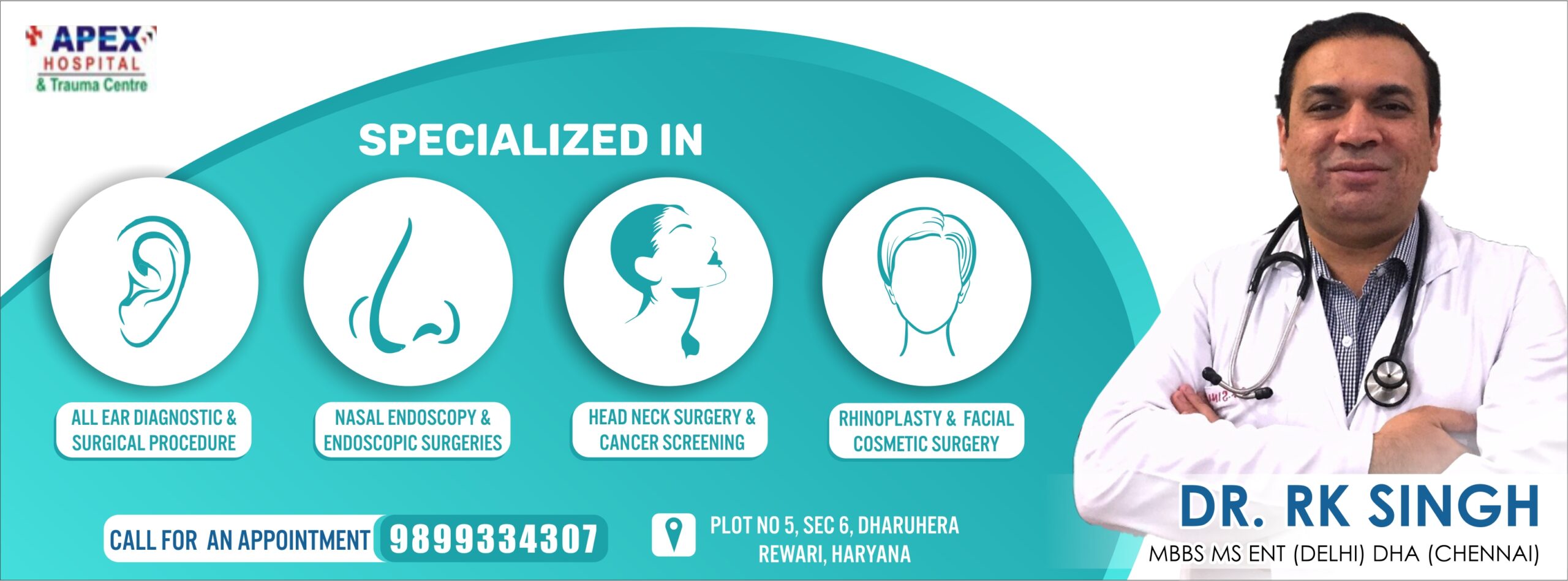
Otolaryngology also called ENT or Ear Nose and Throat is commonly referred to as a school of medicine that deals with problems related to ears, nose and throat. An ENT specialist or an otolaryngologist is a doctor who specialises in preventing or treating conditions that affect your ears, nose, throat, as well as other associated parts of your head and neck.
What do ENT specialists treat?
The Ears – A unique area of ENT specialists or otolaryngologists is treating ear disorders. ENT DOCTOR are professionally trained in medical as well as surgical procedures for treating issues with your ear.
The Nose – ENT doctors are equipped to treat nasal cavities and sinuses. treatment of the nasal diseases includes allergies and sense of smell, breathing, and appearance of the nose.
The Throat – ENT specialists possess expertise in treating issues with the larynx (voice box) and the upper aero-digestive tract or oesophagus.
The Head and Neck – When it comes to the head and neck area, ENT specialists treat infectious diseases, both benign and malignant (cancerous) tumors, facial trauma, and deformities of the face.
FAQs on ENT doctors
1. What does an ENT doctor treat?
ENT doctors are specialists who diagnose and treat patients dealing with health conditions and issues like –
- Hearing issues, ear infections, balance disorders, ear noise (tinnitus), nerve pain, and facial and cranial nerve disorders
- Congenital (birth) disorders of the outer and inner ear
- Chronic sinusitis
- Nasal conditions includes allergies and sense of smell, breathing, and appearance of the nose
- Issues with the larynx (voice box) and the upper aero-digestive tract or oesophagus, which includes voice and swallowing disorders
- Infectious diseases, both benign and malignant (cancerous) tumours, facial trauma, and deformities of the face
2. For what symptoms should I consult an ENT doctor?
- Issues with ear, like trauma or injury
- Nerve pathway disorders, which affect hearing and balance
- Ear infection; swimmer’s ear; hearing loss; ear, face, or neck pain; dizziness, ringing in the ears or tinnitus.
- ENT problems in children like birth imperfection in the head and neck and developmental delays. These include ear infection (otitis media), tonsil and adenoid infection, airway problems, Down’s syndrome, asthma and allergy/sinus disease.
- Cancerous and noncancerous tumours in head and neck, for instance thyroid and parathyroid, lump in neck or thyroid, cancer of the voice box.
- Cosmetic, functional, and reconstructive surgical treatment of abnormalities of the face and neck – like deviated septum, rhinoplasty (nose), face lift, cleft palate, drooping eyelids, hair loss.
- Disorders of the nose and sinuses like sinus disorder, nose bleed, stuffy nose, loss of smell.
- Disorders of the throat, voice and swallowing problems like sore throat, hoarseness, swallowing disorder, gastro-oesophageal reflux disease (GERD)
- Allergies due to pollen, dust, food, and other sensitivities that affect the ear, nose, and throat like rhinitis, chronic sinusitis, laryngitis, sore throat, otitis media, dizziness.
3. What tests do ENT doctors typically recommend?
- Hearing tests
- Throat and voice procedures
- Nose and sinus procedures
Leave a Reply